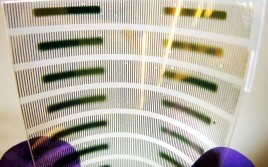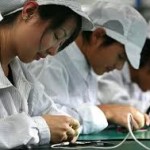Transcript
In the Advanced Technology Institute in the University of Surrey, researchers Dr.Radu Sporea and his colleagues Abdullah Alshammari and Stamatis Georgakopoulos are taking electronics far into the future, working on technologies that are a long way from becoming commercial products but that might one day change the way we think about what technology is. Their research isn’t just looking at what technology can do, but at what it’s made of.
Computer and gadget screens are created on a glass surface. Though this may look state-of-the-art there are extraordinary disadvantages to this material. Glass is heavy. It’s also brittle and breaks easily as anyone who has ever dropped an ipad or a smartphone knows only too well. But it’s not just a disadvantage for the user. Manufacturing glass screens is energy-intensive and hugely expensive. The machines needed to handle the sheets of glass are bulky and have to operate in a near-vacuum. Enormous costs are incurred in transporting such a heavy material.
At the Advanced Technology Institute they are experimenting with new kinds of materials made out of the same essential ingredient that you and I are made of: Carbon. If Carbon-based materials are designed to do everything that conventional, silicon-based ones can do – conduction, semi-conduction and insulation – the possibilities for the technologies of the future will be endless. Our gadgets will be flexible. We will be able to roll them up in tubes. Manufacturing and shipping costs will plummet.
As Abdullah Alshammari puts it: “The future is bright because we no longer need these expensive laboratories. Electronic circuits can be taken out of the lab… these are unconventional systems.”
Radu Sporea, who made this podcast, believes that the rigid electronics of today will one day look as clumsy as the telegraph machines of the nineteenth century look to us.
The future is flexible…



Very useful
The advancement of technology today is very clear, and there are more cars and now you can choose design, color and everything, cell phones are now smarter, education change for the better, and are now more people who can become a career, the way of life has changed much by technology, some say worse, but most say that for good, because our world is growing